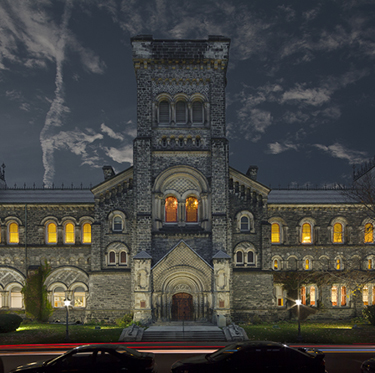Jill Lepore’s three lectures in Toronto .. in the shadow of the new Ontario Progressive Conservative leader Doug Ford ..
Mar 21st, 2018 | By L. Frank Bunting | Category: Key Current Issues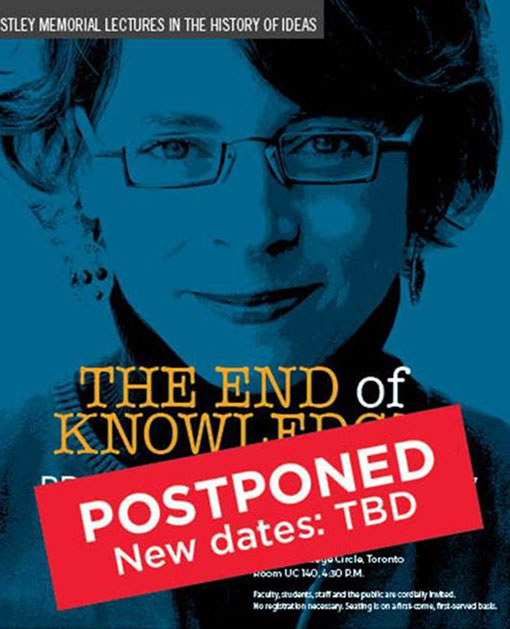 The thing to remember about the United States of America when it intermittently seems on the verge of civil war (metaphorically at least?) is that it is in the end a very complex place, full of many different real-world human beings.
The thing to remember about the United States of America when it intermittently seems on the verge of civil war (metaphorically at least?) is that it is in the end a very complex place, full of many different real-world human beings.
For every “Ugly American” there are at least a few and often enough many more who remain attractive and full of humanity and common sense, regardless of “race, creed or color” ; “race, color, or previous condition of servitude” ; “sex, race, creed, color, or national or ethnic origin” ; or “national origin, race, color, religion, disability, sex, and familial status.”
As one attractive example, Jill Lepore – Harvard University professor of American history and New Yorker magazine columnist –Â was supposed to give her “End of Knowledge” contribution to the F.E.L. Priestly Memorial Lectures at University College in the University of Toronto around this time last year. But extreme late winter weather cancelled her flight from Boston.
Her three “End of Knowledge lectures” – on “Facts,” “Numbers,” and “Data” in more or less chronological order – were put ahead to this past March 13, 14, and 15, 2018.
Even this time a late-season blizzard in Boston came close to canceling the trip. Happily Ms. Lepore managed to catch a plane to Toronto the day before.
I and I would guess most others who made their way to the venerable two-tier University College lecture hall called “UC 140” at 4:30 PM on Tuesday, Wednesday, and Thursday in the middle of March, found her late afternoon talks altogether worth the wait.
(And that was only partly because it is always agreeable to sit on contemporary lecture-hall furniture, amidst awesome wood paneling from an age when high local carpentry skills were more common than they seem today.)
Jill Lepore herself began her first talk with some brief thoughts about the attractions of spending time in older buildings on the downtown U of T campus – and how bringing together the academic community, a great variety of students, and curious citizens of the surrounding city (my own classification) was what finally made the “universe” of the university real.
1. Just a “Provocation” and “The Evidence of the Film”
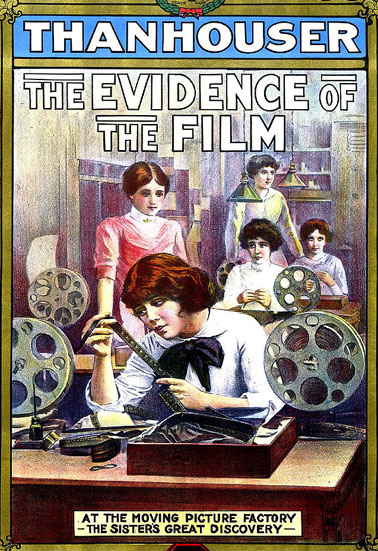 I should confess I knew about Jill Lepore’s work myself mostly through intermittently reading her New Yorker columns. I haven’t as yet read any of her books or articles in academic journals.
I should confess I knew about Jill Lepore’s work myself mostly through intermittently reading her New Yorker columns. I haven’t as yet read any of her books or articles in academic journals.
Her well-deserved reputation, as best as I can make out, rests on her ability to bring the traditional humanist arts and crafts of the historian to bear on the increasingly high technological mysteries of contemporary society in the USA, and similar democratic places in other parts of today’s challenging global village (including of course Canada).
In her three talks on how the evolution of “Facts,” “Numbers,” and “Data” are leading to some new “End of Knowledge,” Ms Lepore also underlined that her intention was just to present a “provocation” to further helpful thinking about our current condition, rather than any finished  theory about what lies ahead.
Among many other things, Jill Lepore has received awards for her undergraduate teaching at Harvard, and this shows in her public lecture style as well.
(A male may think she gets away with female tricks in winning over audiences that no man would be allowed, but that is probably only fair after so many centuries of female oppression by so many different patriarchies, and so forth.)
As do many public lecturers today, I suppose, Ms Lepore also uses various visual aids to her talking. As an intermittent consumer of such events, however, I don’t think I have seen quite so many short clips from movies and TV helpfully offered as historical evidence before – from a 1913 short movie called “The Evidence of the Film,” to “Desk Set” with Katherine Hepburn and Spencer Tracy in 1957, to Stephen Colbert on “Truthiness” in 2005.
I am not at all sure that what I took from Jill Lepore’s three late winter 2018 Toronto talks on the “The End of Knowledge” is what she wants or expects from her audience.
But I took something from what she had to say that I found helpful in my own haphazard thinking about the depths of our current condition. And that seemed in the spirit of her remarks.
2. Toward “These Truths : A History of the United States” (September 2018)
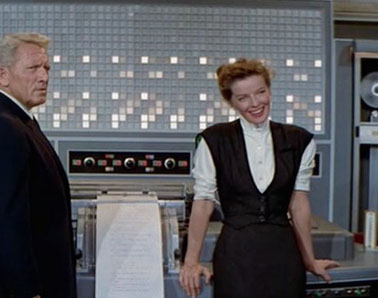
Spencer Tracy introduces the mainframe computer to old-school fact-checker queen Katherine Hepburn in Desk Set, 1957.
If I had to quickly summarize the broad drift of the talks still left in my mind, the weekend after, I would just struggle through something like this :
* “Facts” date from the 13th century age of the Magna Carta in England and the start of trial by jury in English common law. (Among many other things Ms Lepore has given courses in the “history of evidence” at Harvard Law School.)
* “Numbers” date from the Western European political and economic turbulence of the 17th and 18th centuries (from the English Civil War to the American War of Independence, in the anglophone countries). Modern democracy is all about numbers, Ms Lepore stresses. It is “rule by counting” (votes at elections in the ultimate case).
* “Data” has some prefiguration with the birth of photography in the 19th century, but its age begins decisively with the birth of the UNIVAC mainframe computer not long after the Second World War, in the middle of the 20th century. And it culminates with the current era of high information technology dominated by the Internet, Google, and Silicon Valley.
As I discovered in my own travels on the net a few days after Ms. Lepore’s three lectures in Toronto, at least a very sketchy and condensed version of her underlying argument on “The End of Knowledge” (omitting the middle stage of “Numbers” altogether) appeared in an article from the March 21, 2016 issue of The New Yorker, called “After the Fact … In the history of truth, a new chapter begins.”

Jill Lepore has a photo of a San Francisco marquee of this sort with her "I Google therefore I am not" on it. But this was the closest we could find on the net ourselves!
The best advice I can give is just read this article for yourself. (It weighs in at not much more than 2500 words – which could take as much as 20 minutes to read slowly and aloud, and considerably less if you are an at all efficient silent reader.)
For those who still don’t have the time, blogger Mark Whelan has offered a much shorter (and simpler) summary : “There was a great piece by Jill Lepore in the New Yorker last month on the meaning of truth in the age of instantaneous access to ‘facts’. It’s called ‘After The Fact’ and considers the possibility that our ability to ‘know’ might be quickly slipping through our fingers … Any idea, however radical, can be all-to-easily verified by digging up an agreeable article from a dusty corner of the web these days … As Lepore says, ‘I Google, therefore I am not’.”
At the other end of the options available, Ms. Lepore’s three lectures in Toronto apparently draw on her next book, These Truths: A History of the United States – available this coming September 2018 (in time for the US mid-term elections, as someone suggested). And my own best testimony to just how impressed I was by what she had to say on March 13, 14, and 15 in the same year is that I enthusiastically intend to buy and read this book in the fall (at last!).
3. Meanwhile … life and times of Wonder Woman Jill Lepore
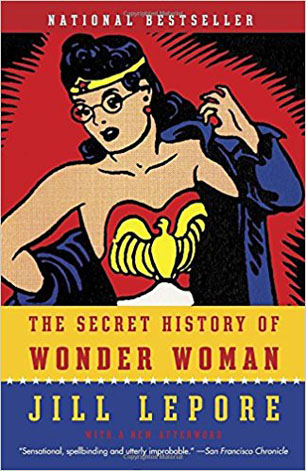 Back in front of my own desktop PC monitor in March 2018, looking out the office window at the leafless trees and the parking lot next door, I discovered a few other intriguing things about Jill Lepore – practicing my own version of “I Google, therefore I am not.”
Back in front of my own desktop PC monitor in March 2018, looking out the office window at the leafless trees and the parking lot next door, I discovered a few other intriguing things about Jill Lepore – practicing my own version of “I Google, therefore I am not.”
One of her more recent books is The Secret History of Wonder Woman (2014) – in which she explores “how this comic book character, created in 1941, remade American feminism,” while also offering “ a biography of Wonder Woman’s larger-than-life and vaguely creepy male creator, William Moulton Marston” (according to Dwight Garner in The New York Times).
As the principal of University College in Toronto noted in introducing her at UC 140 last week, just to contemplate what Jill Lepore has done and continues to do with her time is to appreciate that she qualifies as a Wonder Woman in her own right.
Consider the current public “Lectures” section of her space on the Harvard University website. Late this past November 2017 she talked at Princeton University in New Jersey on “American History from Beginning to End.” Then this past February 2018 she delivered what seem like parallel talks at the University of California, Irvine, and the Radcliffe Institute back at Harvard in Massachusetts. In March she has now been to University College in Toronto of course, and Case Western Reserve University in Cleveland as well. Then she’ll be at Elon College in North Carolina in April, and the Historical Society of Pennsylvania in Philadelphia in May.
In my quick and dirty Googling in search of more quick and dirty facts, numbers, and data on Jill Lepore, I stumbled across four (to me) notable examples of blogger Mark Whelan’s “agreeable article from a dusty corner of the web” (two of which even have Canadian content). I offer samples from them here in reverse chronological order :
* From “Finding Louis Riel’s Voice, posted on May 9, 2016 by lnaus, Written by guest blogger, Max Hamon.” Hamon has found “a new archival document” on the Métis founder of Manitoba’s college days in Montreal.
It has made him ponder the deeper meanings of historical documents : “What do they do to us? (Or, to borrow from Jill Lepore, do we love them too much?).” He footnotes his borrowing with “Jill Lepore, ‘Historians Who Love Too Much: Reflections on Microhistory and Biography,’ Journal of American History 88, no. 1 (2001): 129—44.”
* From the Harvard Crimson website, a March 6, 2014 article by Maria R. Silber on “Jill Lepore: A Historian’s History … Her work as an academic, a professor, and a magazine writer is to bring alive documents of the past; speaking with her is like encountering a living book.”
At Harvard in the spring of 2014 Ms Lepore was co-teaching History 1400: “Intro to American Studies,” with “English professor Louis Menand.” Mr. Menand as it happens gave the October 2015 F.E.L. Priestly Memorial Lectures at University College in the University of Toronto on “Art and Thought in the Cold War.” (And guess who went to those as well?)
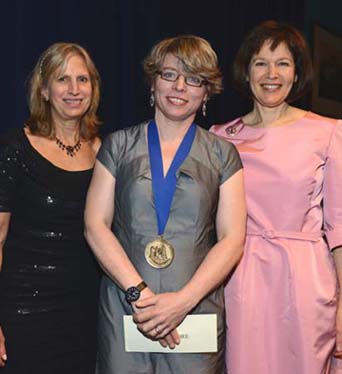
Jill Lepore (centre) receives 2015 American History Book Prize from New-York Historical Society for The Secret History of Wonder Woman.
Maria Silber reports that when she asks Louis Menand about Jill Lepore, he “says simply, ‘She’s a ball of fire.’” Silber goes on : “When she gets excited about something, Lepore twists a little bit in her chair and grins. This is not uncommon: ‘I’m the person who laughs too loud at the joke. I’m so easily amused. I’m so easily fascinated, and so easily devastated.’”
Silber notes as well : “Her essay ‘Just the Facts, Ma’am,’ explores the way in which history can be just as factually problematic as fiction: ‘Every history is incomplete; every historian has a point of view; every historian relies on what is unreliable–documents written by people who were not under oath and cannot be cross-examined.’”
* From the Harvard Gazette site, an August 8, 2012 article by Katie Koch on “From cradle to grave, through history … Lepore’s ‘Mansion’ chronicles American views toward stages of life.” This introduces the Jill Lepore book called The Mansion of Happiness: A History of Life and Death – the Amazon blurb for which reads : “Renowned Harvard scholar and New Yorker staff writer Jill Lepore has written a strikingly original, ingeniously conceived, and beautifully crafted history of American ideas about life and death from before the cradle to beyond the grave.”
It may say something about both the historian and the article writer that right at the start of her piece Katie Koch reports on how “‘I didn’t set out to write a book about life and death,’ says Lepore … Then, with the arrival of a $6,000 overdue notice from Widener Library, came her expensive epiphany – the seemingly disparate books she’d been turning to in her research” actually were all about life and death. (And : “most of the fine was later forgiven.”)
* From the Toronto Star, a November 12, 2010 article by Mitch Potter on “The U.S. Constitution as celebrity … The rising star of the Tea Party movement isn’t a person, it’s a document … ‘What we’re seeing at the Tea Party rallies is a comic-book, American heritage version of the past that comes in defiance of historical analysis,’ says Jill Lepore.”
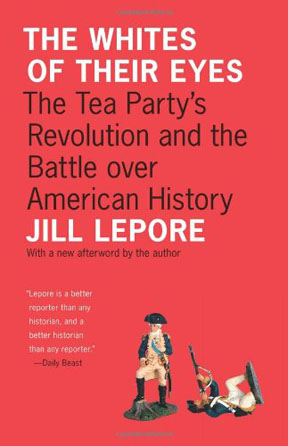 Mitch Potter’s piece here is all about the Lepore book called The Whites of Their Eyes: The Tea Party’s Revolution and the Battle over American History. As Potter explains, Lepore “traces the Tea Party’s roots to the bicentennial of the 1970s, when few Americans could agree on how to tell the messy story of the country’s beginnings … ‘Vietnam, Kent Sate, Watergate, all those assassinations – it was a time when it felt really bad to be American, and a portion of our population never really got to the other side of the crisis,’ Lepore told the Toronto Star in an interview this week.”
Mitch Potter’s piece here is all about the Lepore book called The Whites of Their Eyes: The Tea Party’s Revolution and the Battle over American History. As Potter explains, Lepore “traces the Tea Party’s roots to the bicentennial of the 1970s, when few Americans could agree on how to tell the messy story of the country’s beginnings … ‘Vietnam, Kent Sate, Watergate, all those assassinations – it was a time when it felt really bad to be American, and a portion of our population never really got to the other side of the crisis,’ Lepore told the Toronto Star in an interview this week.”
Again my best advice is just read the article yourself. But here are four Jill Lepore quotations from this source that I especially liked myself :
(i) “I find it heartbreaking that there are these people who felt they lost touch with the meaning of America until they found it in the Tea Party movement …Â as an historian, I do have a narrative of the meaning of America that I find very powerful – but I guess I and my colleagues haven’t done a good enough job of sharing it.”
(ii) “There are plenty of cynical people leading the Tea Party movement and plenty of self-interested businesses pumping money in for their own reasons … But ordinary people who have been drawn to the streets as Tea Partiers, what they are feeling is genuine … If they felt powerless before, they should feel powerful now because they sent people to Washington. Democracy works.”
(iii) “You can’t just extract five guys from the 18th century and say, ‘They are just like us and if we can just figure out what they wanted we could live our lives that way.’ That’s what we would ask of Jesus and the Gospels. That’s not what you ask of history.”
(iv) “As both a Catholic and a historian, … I think of all the power that Christians mobilized during the abolitionist movement in the 19th century, when so many dedicated their lives to ending human bondage … There are plenty of American Christians … who do not have a conservative political agenda … If the Tea Party movement becomes more overt and explicit in its interpretation of the Constitution as divinely inspired, it will narrow their base.”
4. Provisional conclusions (and a footnote on the new Ontario Progressive Conservative leader Doug Ford )
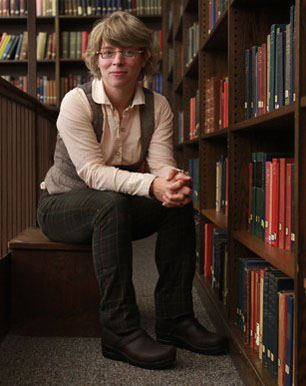
Jill Lepore in the stacks of her local research library : one of her favourite places, it seems. When she first discovered them as a student she burst into tears.
I’ll conclude with a few brief notes on what I think Jill Lepore’s broad “political” message is at the moment (subject to change when I finally do read These Truths: A History of the United States this coming fall) … and what in all this I think I agree and disagree with myself!
To start with, “The End of Knowledge” – or as blogger Mark Whelan has put it “the possibility that our ability to ‘know’ might be quickly slipping through our fingers” in a new age of high information technology (and alleged Russian witch hunts etc, etc, etc, etc)Â – is of course an alarming proposition. And my sense is that, from her historical analysis, Jill Lepore believes democracy in America (and its other current and possibly future haunts) ought to be talking seriously about this prospect, and figuring out how to avoid or at least evade it.
At the start of her three talks in Toronto she wondered aloud if her reflections in March 2018 might be a little darker than if she had given them as first planned in March 2017 (before any full consciousness of just how both crazy and serious the new age of Donald Trump in the USA today actually was had settled in?).
At the start of her last talk on Thursday, March 15, 2018, however, she said how much she’d enjoyed her few days in Toronto. (For one thing, while the place was still cold there was no late-winter blizzard as there had been in Boston. She had also come to town with her husband as something of a holiday, leaving behind older sons to shovel snow. There had been pleasant dinners with local academics … she has many local admirers … )
It may also be that, unlike the George Orwell who wrote Animal Farm and 1984, Jill Lepore is just not “a gloomy bird.” To cite Maria Silber in the Harvard Crimson again : “She grew up in West Boylston, Mass., on Franklin Street … Her father was a junior high school principal who met her mother when he hired her as an art teacher. In a memoir piece she wrote for The New Yorker called ‘The Prodigal Daughter,’ Lepore writes that her mother … ‘liked to command me to do things I found scary.’” (And I’d highly recommend reading this entire New Yorker article as well. It almost had me in tears.)

“‘Impeachment Now’ billboard outside Trump's Mar-a-Lago resort. Let's take a moment to thank everyone who helped make this happen!”
In any case, around 5:15 PM on March 15, 2018 Jill Lepore was in too good a mood to entertain any too desperately depressing scenarios about future high technological dystopias. To me she seemed to be saying that there is light at the end of the tunnel, if the old ages of facts and numbers can and will somehow stand up and refuse to be overwhelmed by the new age of data.
This may seem too much like a minor vague aesthetic preference for the past over the future (if not necessarily the present) that virtually all of us who are in any way fascinated by history will in some degree share.
Yet in Jill Lepore’s more sophisticated but still old-fashioned historical analysis, it seems to mean that seriously trying to understand (and appreciate) the human past in all its dark and bright parts can help us deal more effectively with the challenges of the present, and the future.
As a crude case in point, she prefaced her remarks on “Data” with a glance back at the earlier history of photography in the 19th century. Some arguments about the impact of that new technology are similar to arguments about the new high information technology today. (Walt Whitman, eg, believed photography could bring a stronger democracy, and perhaps it has.)
At various points in her three talks in Toronto Ms Lepore did express some more ordinary aesthetic preferences for the attractions of (at least some) 19th century buildings in North America, 1930s to (say) 1970s movies (over, eg, “The Matrix,” 1999), and the smart, fact-checking women who dominated mainstream editorial processes in the 1950s.
In my 70s I can share much of this myself. My favourite music is the modern jazz of 1940—1970. I like spending time in UC 140 and other parts of the 19th century University College on the University of Toronto campus (or in certain parts of the Osgoode Hall court facilities in downtown Toronto – a place that still preserves a few elegant earlier 19th public spaces) …
What I didn’t take from Jill Lepore’s “End of Knowledge” talks that I also feel myself is some compensating attraction to the more democratic, optimistic, and even romantic possibilities of the new information technologies of the Internet, Google, and Silicon Valley – at least as a means of bringing the twisted lessons of the past to some wider attention in the forgetful present.
(But that may just be because, in my 70s again, I just wasn’t paying close enough attention … )
Oh, and about the new Ontario Progressive Conservative leader Doug Ford, who had just been elected to his position a few days before the “End of Knowledge” arrived in town … finally … I don’t think he would be too impressed by Jill Lepore – anymore than he once was by the Margaret Atwood he had never heard of until he was on Toronto city council …
And that is just one of many reasons why I can’t see myself voting for him on June 7, when democracy in Canada’s most populous province of Ontario makes its own rule-by-counting decision, about who is going to be trying to run the provincial (ie “state”) government over the next few years. As far as I’m concerned, while there are a few important enough differences, Doug Ford is finally on the wrong side of history, just like Donald Trump in the USA … And I’d guess that if Jill Lepore had time to worry about such things, north of the North American Great Lakes, she would almost certainly agree.
